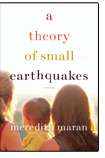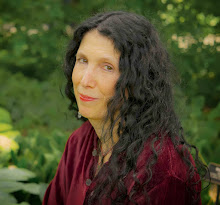Meredith Maran published her first poem at the age of six in Highlights for Kids. How cool is that? She's gone on from that illustrious start to become a journalist, book critic, and absolute knockout writer. (Go read My Lie, her memoir about false memory, immediately if you haven't already.) Her novel, A Theory of Small Earthquakes, is a breathtakingly smart, funny and heart-wrenching novel about sexuality, family and what we do--or don't do--for love.
I'm honored to have Meredith here. Meredith, I can't thank you enough!
What sparked the idea for this novel?
A decade ago, a friend who shall remain nameless told me a true story about such an alternative family, whose existence required so much forgiveness on the part of all involved, I thought, "If only I were a novelist, that would make a great plot." As I watched the story unfold in real time in my friend's real life, the itch to write it finally overcame my fear of attempting a novel. After a lifetime of writing only nonfiction, that fear was epic—and, as it turned out, well-founded. The novel took two years to write, five years to rewrite, and many gnawed fingernails to sell. And it's been the most thrilling writing experience of my life. Je ne regrette rien.
Your novel is a brilliant exploration of what makes a happy family, what's "normal" and how do we navigate this new terrain. Do you think, given what's going on politically, that we can ever, as a people, simply let people be whomever they want to be and love whomever they love?
Sometimes I feel that that unwillingness to be accepting is changing, but often, I feel despair.
Sometimes I feel that that unwillingness to be accepting is changing, but often, I feel despair.
Abandon your despair, ye who seek equality! There are discouraging moments, for sure--the current Republican Presidential campaign being a very long, drawn-out, excruciating series of them--but oh, so much progress as well. Let's start here: I'm legally married to a woman. In the State of California, at least. Don't get me started about the thousands of dollars my wife and I spend each year to deal with our lack of federal marriage rights, but hey. We're married!
Having been an activist since the sixties (long before I was IN my sixties!), I've seen the civil rights movements of other groups--women and people of color, to name two--making such creaking, creeping gains. Biracial President notwithstanding, you could argue that things are worse, now, for some folks who have been fighting for their rights since they arrived here on slave ships.
Anyone who knows me will attest to my impatience. But where gay rights are concerned, I'm thrilled with the gains we're making.
I loved the title. Can you talk about it?
Oy, the title.
Over the eons it took to bring this book from concept to publication (see "impatience," above), the novel had at least five working titles, ranging from the original "The Surrogate" to "Boy Girl Boy Girl," which came in a close second to the final. The phrase "A Theory of Small Earthquakes" came to me in a flash, and I loved it, but there were so many factors to consider, and such a big job the title had to do. My dad was a true MadMan, and I grew up naming products at the dinner table, so the marketing concerns were paramount.
I'm a great believer in the meme of "The Little Engine That Could." I'm also more of a realist than an optimist. So I knew my novel faced the danger of, shall we say, marketplace resistance (i.e., poor sales). Hey, it's a first novel, set in Berkeley, about a child being raised by two women who used to be lovers—and are still, in many ways, lovers—and a man, whom one of the women is married to, who might or might not be the child's biological father. (See "acceptance of gay people," above.) Not as easy a sell as, say, a novel about one of Hemingway's wives, or a novel by Jodi Picoult.
Also, the title had to position the book somewhere along the dread spectrum of "literary" versus "commercial" fiction. I'm doing my next nonfiction book ("Why We Write," out from Penguin in 2013) specifically to demonstrate what harmful bullshit that dichotomy is. I hate it, and the way it limits readers and writers. But it exists. And I knew that My Little Novel That Could needed all the help it could get to make it up the mountain of commercial viability. So the title had to help sell the book to those who enjoy good writing as well as those who enjoy a twisty, turny, plot-driven story.
I worried that "A Theory of Small Earthquakes" was too "arty," too "literary." I worried that people would think it was another nonfiction book by Meredith Maran, who had decided to give Mary Roach a run for her money by becoming a science writer. I worried (did I mention that I'm extremely superstitious?) that giving my novel that title would cause actual earthquakes (which it seems to have done, but at least they were small earthquakes). On the upside, as I said, I loved the phrase. And the earthquake metaphor was so fitting for a book set in the Bay Area, about a woman who hopes that if she discloses enough "small lies," the big lie upon which she's built a family won't blow up in her face.
Here's a little insider info. After we agreed to give the book that title, my brilliant, adored and adoring editor had me put more earthquake content into the book. Craft-wise, the most challenging writing I've ever done was to describe an earthquake on the page in such a way that a reader who's never lived through one would actually know what it feels like.
You're also a book critic as well as an author--does being a critic change the way you look at your own work? Are you ever aware of how a critic might look at your work or do you shut that out as you are writing?
Long before I was a book critic, I was the New York Jewish child of New York Jews. 'Nuff said? Who needs outside critics with that DNA? Hearing all the terrible things people might say about my shitty first novel wasn't a job I had to contract out.
As we speak, I've just received my first copy of the actual book. I'm scared to look. (See "New York Jewish Self-Loathing," above.)
On a less serious note (!), being a critic has confirmed my suspicion that the book review is a rigged game. Many reviews I read are about the reviewer, not the book. Reviews of my previous books have proved how rare it is for a reviewer to read, let alone contemplate, the book under review. Even though reviewers are paid abysmally ($200 or less is common), I believe a book review is a service provided to the reader, not a showplace for my own brilliance or maliciousness or brilliant maliciousness; not a way to extract my revenge for being underpaid by a factor of at least ten.
So if I'm asked to review a book I hate, I send it back. I've written one really negative review in my life, and that was of a book whose author was (and still is) dead. Writers have enough mishegass to deal with. I might not get to heaven, but it won't be because I disrespected the effort and integrity of a fellow/sister writer in order to boost my own ego.
Tell us about your writing life. Do you outline or is it more intuitive? Do you keep a schedule?
Very simple schedule. Wake up before the sun. Work happily like a motherfucker till bedtime or "Homeland," whichever comes first. Eat something soupy at desk around 8AM and again around 2PM. Break for two hours for perspective-restoring hike with a writer friend. Go to sleep worrying book won't sell . Wake up worrying book won't sell and I'll never have the chance to do this again. Repeat.
PS I wouldn't trade this life for anything, and I've proved that by refusing to trade this life for anything. Even an actual living wage.
What's obsessing you now?
See "book won't sell," above. Also see "I'll never have the chance to publish another one," above.
What question didn't I ask that I should have?
The question no writer with a fresh book launch wants to be asked, except that I do want to be asked, because it's my current obsession. "What's next?" Another novel!
I'm a total convert. I'm knee-deep into the next novel, about which I'm absolutely thrilled, as is my agent, which is very encouraging. Now I just need to find a space between pimping "Earthquakes" and writing book reviews, so I can finish it. Hint: it's about WEALTHY HETEROSEXUALS. But they have this renegade teenage daughter who holds her parents' hypocrisies up to their faces like a mirror, which helps me not to hold their heterosexuality or their financial success against them. In fact, I'm madly in love with the characters, which I take as the best portent of all.






No comments:
Post a Comment